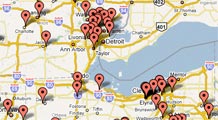States feel the pain on auto dealer row
Loss of dealerships, coupled with declining car sales, is hammering state and local budgets already thinned by the recession.
NEW YORK (CNNMoney.com) -- The downfall of the American auto industry is wreaking havoc on state and local budgets from coast to coast.
The decline in auto dealerships, coupled with the drop in car sales, is costing states and municipalities millions of dollars in lost sales taxes, not to mention lost income and property taxes and other fees.
Though exact numbers aren't available, car purchases account for about 12% to 15% of sales tax revenues in many states, estimates the Center on Budget and Policy Priorities. And sales taxes usually account for about one-third of a state's revenue.
As the recession deepens, state tax revenues have fallen off a cliff. This has opened up yawning gaps, forcing officials to scramble anew to balance their budgets.
The drop in sales taxes are the worst since World War II, and the plunge in car sales are a major reason for it, said Donald Boyd, senior fellow at the Nelson A. Rockefeller Institute of Government, a public policy group.
"The declines have been devastating," he said. "It comes at a time when the states can't afford it."
Take California, which has seen new car sales plunge 43% in the first quarter and 186 dealerships disappear since the start of 2008. The Golden State, which is struggling to close a $21.3 billion budget gap, is slated to lose 32 Chrysler dealerships and possibly 100 GM dealerships as part of the automakers' restructuring.
New car sales are the single largest component of the sales tax base, accounting for 10.6% in 2006, the latest year available, according to the state's Department of Finance. Municipalities also depend on the sales taxes, as well as other revenues such as property tax, to fund their operations.
"Many communities are having to let go firefighters and police because the sales tax revenues are down," said Peter Welch, president of the California New Car Dealers Association.
Indiana, which is wrestling with a $1 billion budget gap, saw auto sales taxes fall by 23% in the second quarter, said Chris Ruhl, the state's budget director. Car purchases are the third largest source of sales tax revenue, until recently accounting for about $550 million a year.
The state is now tightening its belt, Ruhl said, to deal with the lower revenues. On Monday evening, Gov. Mitch Daniels recommended cutting spending by 2.5% across-the-board and tapping into the state's $1 billion-plus rainy day fund to balance its budget.
New Jersey, meanwhile, is also feeling the effects of the auto industry meltdown. The Garden State has lost 170 dealerships since the start of 2007 and could lose 90 more in the cutbacks by Chrysler and General Motors (GMGMQ), which filed for bankruptcy on Monday. New car sales are down 33% for the first four months of the year.
This plunge has a drastic effect on state revenues, said James Appleton, president of the New Jersey Coalition of Automotive Retailers. He estimates that the state loses $10 million in revenue for every 1% drop in car sales. Incomes taxes also suffer when dealers close since each employs about 65 people.
State officials are now scrambling to close a $4.4 billion budget gap, exacerbated by an unprecedented decline in sales taxes.
"Until these markets come back, the state will continue to suffer," Appleton said.
More than just sponsoring the local Little League team, auto dealerships contribute to the coffers of many cities.
For Scottsdale, Ariz., auto purchases represent 11.6% of the city's sales tax revenues. But the category is down 29% over the past year -- the most of any -- and six of the 20 dealerships along the city's Motor Mile have shuttered.
Facing not only the shriveling of car sales but a downturn in construction and tourism, officials have eliminated 200 positions and are looking at cutting more to close a $9 million budget gap.
"The loss of the auto dealers has aggravated the effects of the recession," said Pat Dodds, a city spokesman. ![]()



